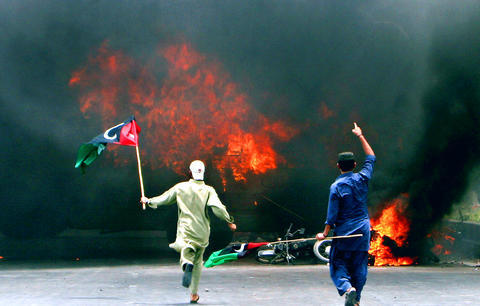Gunbattles and attacks killed at least 18 people and wounded dozens yesterday as Pakistan's political crisis descended into violence between rival parties over President General Pervez Musharraf's suspension of the chief justice.
In one clash, pro-government and opposition activists traded assault rifle fire about 1km from Karachi's international airport. As volleys rang out, Kamran Ali, a newspaper vendor, said that three unidentified people traveling in a car were killed by the firing, and a woman passer-by was wounded.
Musharraf yesterday ruled out declaring a state of emergency, as the turmoil sparked by his March 9 suspension of Chief Justice Iftikhar Mohammed Chaudhry entered a new deadly phase. In comments reported by the state-run Associated Press of Pakistan news agency, the military leader urged the nation to stand united and remain peaceful.

PHOTO: AP
Officials contacted at three hospital in Karachi reported at least 18 people had died in the violence and 55 were wounded. Police reported more than 70 wounded, many from gunfire.
In another part of the city, private TV network Aaj said its building had been fired on by supporters of a pro-government party, the Mutahida Qami Movement (MQM), who wanted them to stop airing live footage of the unrest in the city.
Arshad Zubairi, the network's chief executive, said cameramen and journalists on the roof of the building had to take cover and windows were shattered but no one was hurt. Aaj remained on air uninterrupted.
"We are under attack," senior Talat Hussain said on air as he sheltered behind a wall. "We have seen no security force. No one has come to help us."
Officials of the MQM were not immediately available for comment about the incident.
The fighting broke out as Chief Justice Iftikhar Mohammed Chaudhry arrived for the latest in a series of rallies by lawyers and opposition parties protesting his March 9 suspension.
Critics accuse Musharraf, who took power in a bloodless coup in 1999, of trying to sideline the independent-minded judge to head off legal challenges to Musharraf's plan to seek a new five-year presidential term later this year. The government maintains the move was not politically motivated and that Chaudhry had abused his office.
Two months of anti-Musharraf rallies organized across the country by opposition parties and lawyers have been gathering momentum, and yesterday, pro-government parties were responding with their own shows of strength.
Musharraf was due to address a huge gathering in Islamabad to galvanize his support base, but the Karachi bloodshed will only deepen the sense of crisis in the country.
Opposition activists accused MQM activists of attacking them, including in front of the airport.
An Associated Press reporter could see MQM supporters calling for ammunition and firing from buildings, reportedly at supporters of the Pakistan's People's Party and Jamaat-e-Islami. Opposition supporters were firing back. A senior MQM leader, Farooq Sattar, said that four of its supporters died in the clash. It was not clear if they included the three people killed in the car.
Roadblocks, including trucks with deflated tires apparently placed by the MQM, prevented most of Chaudhry's supporters from reaching the airport to greet him.

CHARGES: The former president, who maintains his innocence, was sentenced to 27 years and three months in prison for a failed coup bid, as well as an assassination plot Far-right former Brazilian president Jair Bolsonaro is running out of options to avoid prison, after judges on Friday rejected his appeal against a 27-year sentence for a botched coup bid. Bolsonaro lost the 2022 elections and was convicted in September for his efforts to prevent Brazlian President Luiz Inacio Lula da Silva from taking power after the polls. Prosecutors said the scheme — which included plans to assassinate Lula and a top Brazilian Supreme Court judge — failed only due to a lack of support from military top brass. A panel of Supreme Court judges weighing Bolsonaro’s appeal all voted to uphold

The latest batch from convicted sex offender Jeffrey Epstein’s e-mails illustrates the extraordinary scope of his contacts with powerful people, ranging from a top Trump adviser to Britain’s ex-prince Andrew. The US House of Representatives is expected to vote this week on trying to force release of evidence gathered on Epstein by law enforcement over the years — including the identities of the men suspected of participating in his alleged sex trafficking ring. However, a slew of e-mails released this week have already opened new windows to the extent of Epstein’s network. These include multiple references to US President Donald

Chinese tech giant Alibaba yesterday denied it helps Beijing target the US, saying that a recent news report was “completely false.” The Financial Times yesterday reported that Alibaba “provides tech support for Chinese military ‘operations’ against [US] targets,” a White House memo provided to the newspaper showed. Alibaba hands customer data, including “IP addresses, WiFi information and payment records,” to Chinese authorities and the Chinese People’s Liberation Army, the report cited the memo as saying. The Financial Times said it could not independently verify the claims, adding that the White House believes the actions threaten US security. An Alibaba Group spokesperson said “the assertions

LEFT AND RIGHT: Battling anti-incumbent, anticommunist sentiment, Jeanette Jara had a precarious lead over far-right Jose Antonio Kast as they look to the Dec. 14 run Leftist candidate Jeannette Jara and far-right leader Jose Antonio Kast are to go head-to-head in Chile’s presidential runoff after topping Sunday’s first round of voting in an election dominated by fears of violent crime. With 99 percent of the results counted, Jara, a 51-year-old communist running on behalf of an eight-party coalition, won 26.85 percent, compared with 23.93 percent for Kast, the Servel electoral service said. The election was dominated by deep concern over a surge in murders, kidnappings and extortion widely blamed on foreign crime gangs. Kast, 59, has vowed to build walls, fences and trenches along Chile’s border with Bolivia to